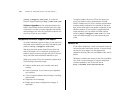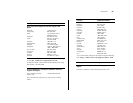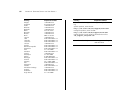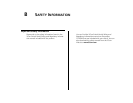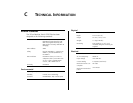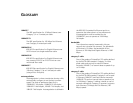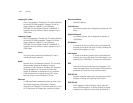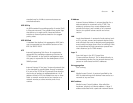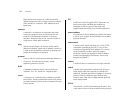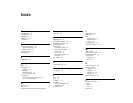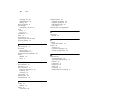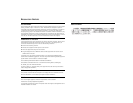
72 GLOSSARY
category 5e cables
One of five grades of Twisted Pair (TP) cabling defined
by the EIA/TIA-568 standard. Category 5e can be
used in Ethernet (10BASE-T), Fast Ethernet
(100BASE-TX) and Gigabit Ethernet (1000BASE-T)
networks, and can transmit data at speeds of up to
1000 Mbps.
category 6 cable
One of five grades of Twisted Pair (TP) cabling defined
by the EIA/TIA-568-B standard. Category 6 can be
used in Ethernet (10BASE-T), Fast Ethernet
(100BASE-TX) and Gigabit Ethernet (1000BASE-T)
networks, and can transmit data at speeds of up to
1000 Mbps.
client
The term used to describe the desktop PC that is
connected to your network.
DHCP
Dynamic Host Configuration Protocol. This protocol
automatically assigns an IP address for every
computer on your network. Windows 95, Windows
98 and Windows NT 4.0 contain software that
assigns IP addresses to workstations on a network.
These assignments are made by the DHCP server
software that runs on Windows NT Server.
Ethernet
A LAN specification developed jointly by Xerox, Intel
and Digital Equipment Corporation. Ethernet
networks use CSMA/CD to transmit packets at a rate
of 10 Mbps and 100 Mbps over a variety of cables.
Ethernet address
See MAC address.
Fast Ethernet
An Ethernet system that is designed to operate at 100
Mbps.
Gigabit Ethernet
An Ethernet system that is designed to operate at
1000 Mbps.
full-duplex
A system that allows packets to be transmitted and
received at the same time and, in effect, doubles the
potential throughput of a link.
half-duplex
A system that allows packets to be transmitted and
received, but not at the same time. Half-duplex is not
supported for 1000 Mbps. Contrast with full-duplex.
IEEE
Institute of Electrical and Electronics Engineers. This
American organization was founded in 1963 and sets
standards for computers and communications.
IEEE 802.1D
Specifies a general method for the operation of MAC
bridges, including the Spanning Tree Protocol.
IEEE 802.1Q
VLAN Tagging - Defines Ethernet frame tags that
carry VLAN information. It allows switches to assign
endstations to different virtual LANs, and defines a



